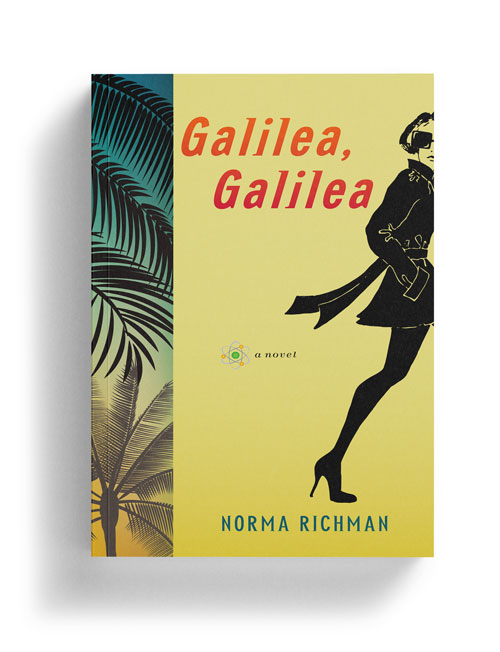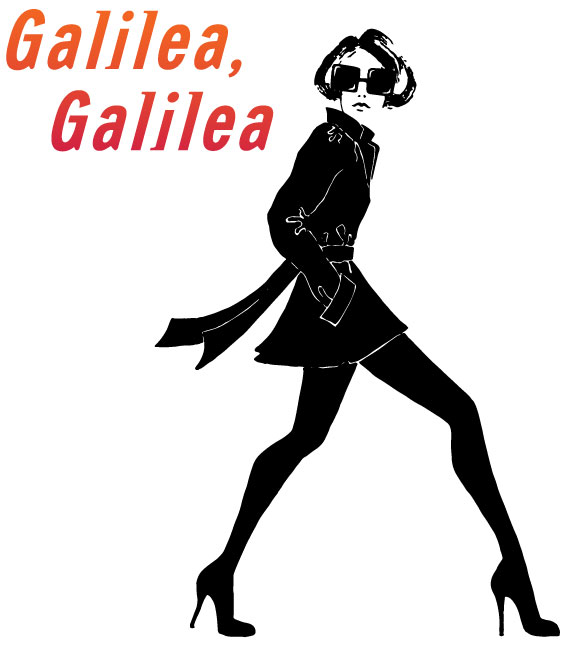
It takes a sharp mind, a stiff drink, and a dress that won’t quit
to solve a mystery like Galilea.

Pure fun, a lot of humor, and a little science to boot. The perfect escape from reality. Our heroine is a quirky female physicist, a sort of Nancy Drew for adults.
With a penchant for haute couture, she’s a sucker for a good cocktail and a good crime. Join her on zany capers around some of Southern California’s swankiest, sunniest and most intriguing hot spots.
About the Book
The story begins after the protagonist, Galilea, loses her Sierra Madre Canyon home to an earthquake. A typical occurrence in SoCal, especially if the home is not built to code—anybody’s code. She begins to look back on her thirty-something life and at the same time forward to the no-regrets “Lee” she decides to become. Having lost out on a job at Caltech, she begins teaching physics at Pasadena City College. Her first foray into teaching takes her into the underground basement at the school (which does really exist), as she contemplates her lesson with radioactive material. Later she meets with a long-time friend, Isaac, a particle physicist, at The Tap Room in the Langham Hotel. He encourages her to not give up on the position at the Institute, hinting that there is something secretive going on. We are soon introduced to a few more characters with humor and insight: we learn more about Isaac, his cat Bernoulli (a physics thing, if you care to look it up), and a younger Lee as she grows into her cynical self.
Isaac entreats Lee to put her physics knowledge to work in order to help his sister, Kat, who has gotten embroiled in a cult in Santa Ynez. Lee meets with, and reflects on, her relationship with her tetchy mentor at PCC, Cato Klein. She learns that he is a professor by day and forensic investigator by night, so to speak, using physics to analyze crimes. She is jealous of his ability to be someone else, while some nights she goes home alone to a pair of sloppy sweats.
At the Santa Ynez compound of Blue Algae Reactant Factor, B.A.R.F., the aforementioned cult, Lee and her friends use science and guts to brave dangers as they attempt to rescue Kat. They encounter a member with flaming red hair—not the color—it literally caught on fire, which actually leads to some humor and a lesson on reading hair product labels.
True to real life, Lee does not completely resolve all of the mysteries; some are left for a subsequent book. But the daring rescue attempt at BARF and the discovery of a nefarious plot to create a Maser weapon (that’s a real thing) lead Lee to a new forensic partnership that she never sees coming.


An Excerpt…
The possibility of an electrified fence and gate loomed large. Fortunately, a padlock on the gate appeared to be unlocked—appeared being the operative word. Not one to take anything for granted, Cato grabbed a fallen branch and maneuvered the lock so that it fell onto the ground. The next step: determine if any portion of the metal gate would shock him into oblivion. Enter the voltmeter; if there was a current running through the chain link, the meter would light up like a Christmas tree. The problem is that it would also beep. “Do you have a Kleenex on you?” Cato whispered. “Something to muffle the sound?”
“If there are hidden surveillance cameras, it won’t matter anyway. Right?” she whispered back. But she took off a shoe and, hopping around on one foot, offered up a white sock. “How’s this?”
“I like a girl who thinks on her feet—no pun intended,” he whispered as he grabbed the sock. “Doesn’t hurt to be extra cautious. You never know if someone is actually watching the monitors . . . or listening.” With that, he wrapped the sock over the top of the voltmeter, leaving only the metal prongs exposed. “If it lights up, we’ll still be able to see the glow.” And if this were some movie, the script would call for me handing you my T-shirt instead of a sock, she thought. In fact, Cato, if this were a movie, we’d probably already be crispy critters at this point, so no clothes needed.
No glow. No beep. A good sign. Nonetheless, he shoved the gate open gingerly with the tip of one shoe. Lee jammed her sock into a back pocket to keep it handy, and then figured out which movie: Indiana Klein and the Mystery of the Blue Öyster.
A pockmarked roadway led them through a series of turns until another gate came in to view. “Great,” they mumbled simultaneously. Lee pointed to a wooden sign overhead. What looked like newer cut-out letters had fallen off, leaving faded script in another color and font exposed. The smaller letters Z.U.M.B.A. & H.O. had been painted directly on the wood, and lying on the ground, in a different font and color, were the letters R, A, and F. Further complicating the scene was a round metal placard nailed to a nearby post. A seal of some sort, like a mandala or a shield, with the letters S.O.S.O.S.O. circling the perimeter. The scene reminded Lee of the summer she spent unearthing artifacts with her Wedd School campmates. Or maybe an episode of Sesame Street. (Today’s show has been brought to you by the letters Z, U, M, B, A, H, O, S, R, and F.)
When she heard Cato’s digital camera clicking away, Lee quickly pulled out her cell phone and began to do the same. A backup might be needed. A crackling sound drew their attention to a drought-tattered thicket of trees on the right. It was at this point that they noticed a golf cart rolling through the branches toward them. She was thinking there would be more carts appearing on the hill above, lined up like a legion of warriors. The Golf Cart Brigade.
Lee thought about snapping a picture of what looked like Yoda on the Ninth Hole but remembered Isaac’s warning: These cults mean business. They both looked in astonishment at this new character in Lee’s imagined movie. For once, Cato was at a loss for words. And Lee’s inner dialogue failed her . . . well, almost: You’ve got to be kidding me. What’s with the cape and hood? The Imperial Army went thataway, guy. The guy was bigger standing up. A lot bigger. As he approached they could see that he was actually sporting an oversize olive green plastic poncho (of the trash bag school of fashion) and a matching rain hood. On one side of his chest were the letters SOS. On the other, the logo for REI, the sporting goods store. Man, I’m sick of this alphabet thing. Cato must have been reading her mind: “Hey, Pat, can I have another vowel?” Who knew he was a Wheel of Fortune fan? “Or can I spin the wheel?” he said in feigned seriousness.
That’s it, Cato, confuse the guy! Using her wits had worked for Lee, but she clearly didn’t invent the tactic. Garbage Bag Guy looked like he was about to smile, but then a grimace was all he could muster. As Cato pulled out a plastic ID card, Garbage Bag Guy got ready to dive for cover. The investigator’s license, Lee supposed. Though, it looked more like the PCC Faculty card. She’d have to remember that one. She had the same card. Garbage Bag Guy grabbed it and tossed it toward the golf cart, where it disappeared into the weeds. That makes sense now. Don’t be too quick to give up something valuable.
#
It was clear that they were approaching a “Take me to your leader” moment. At least they didn’t have to deal with another guessing game regarding the gate. As Garbage Bag Man opened it, Cato and Lee glanced at each other. Nothing resembling wiring appeared to be attached at the hinges or elsewhere. Not a guarantee, but something nevertheless. For the time being, it was not electrified. I’ve got to remember that on the way out, if I make it out, she thought. Cato stumbled backward over a broken patch of concrete walkway, and Lee grabbed on to him, glad that she had chosen her oldest Converse shoes for today’s little outing. “This place could use a little maintenance work,” Cato mumbled under his breath. Lee was hoping Garbage Bag Man was not the maintenance guy. No need to insult this fine gentleman, Cato.
The glass entrance was etched with the words “Tourist Information”; it clearly was not original to the building—a portable trailer of some sort. The transplanted door was sporting a new handle and deadbolt that appeared state of the art, and Lee noticed what looked like the kind of door alarm that relies on breaking the circuit, the connection, between the door and the frame.
“Cato, I think the tourist thing is weird. Maybe they stole the door from somewhere else.” He nodded in agreement, looking more grim than amused.
“The Hotel California, ‘where you can check out any time you like, but you can never leave,’ ” he replied. I have to look that one up, Cato. In the meantime, they both made a point of looking around. Lee spotted surveillance cameras and motioned to Cato. He had already seen them. Garbage Bag Man ushered them inside with a kind of comical flourish, and Cato said, “Thanks, guy. Where’s your master . . . er . . . boss?” Let’s hope that went right over his head. It hadn’t. A hand went up, and Cato and Lee flinched. G B Man reached for his hood and snatched it off, tossing in on a nearby desk, this time with better aim. Then the SOS/REI poncho came off with the same fanfare. Lee was in shock, and apparently so was Cato.
“Welcome. My name is Zin. Zin Ishara. But you can call me Gabe. That’s my given name. Gabriel. Visitors are more comfortable with that, usually.” His features were stunning, Lee thought. A kind of where-have-you-been-all-my-life stunning. Well-coiffed sandy hair, gray eyes, white-white teeth. The whole package. And grinning from ear to ear, to boot. What was even more shocking was his suit, a slim-fit gray wool, and fit it did. This time, Lee had no inner dialogue at her disposal, and she wished she had dressed better. She looked at Cato, who seemed equally impressed, his head in a characteristic double take, only backward, not side to side; in fact, Cato had to take a step back to balance himself.
Lee stepped forward to shake Zin/Gabriel’s hand, not really caring what he called himself. She did want to get closer for her own reasons, but she also wanted a closer look at the lapel pin he was wearing. Gold and the same design as the placard outside. She hoped it was something innocent: a gym membership, a frat pin, even a sober living medal would do. Still not a clue and kind of creepy in a spy cam or evil eye kind of way. She could feel Cato’s hand on her arm pulling her back. I’ve got this, Cato. Or maybe not. A cool head prevailed, and Lee moved aside for Cato.
“Mr. Ishara . . . Zin, can we find someplace to sit? It’s kinda been a long day for me.” Cato playing the age card. No seating in this reception room of sorts meant an office somewhere else, and more to see. Lee avoided glancing at Cato. Looking at Zin/Gabriel was fine for now anyway. Sure enough, they found themselves following Zin through a side door (key card required), where seating consisted of two of those great Barcelona chairs in black leather and chrome—originals, as far as Lee could tell. Facing the chairs was a slab of the thickest of thick green glass mounted on an equally thick glass base. A minimalist chrome desk lamp offered no useful lighting, but the effect was an artful addition to the room. A room out of Architectural Digest embedded in a trailer. Aside from some contemporary artworks—probably also originals, the walls hosted a collection of certificates and a photo that needed closer inspection. Cato began to cough in heaving fits. “Zin . . . uh . . . Gabe, can I impose further and ask for a drink of water?” A raspy voice—not at all like Cato. A ruse or a medical emergency, Cato? Should I be worried? Zin was up and out in a flash, and Cato snapped a few cell phone pictures of the walls, returning to the hacking cough to cover the click of the phone. He had forgotten to silence it, and as soon as Lee realized what was going on, she reached into her pocket and felt around for the little slider on the side of her own phone. They were both taking a chance that there were security cameras aimed at them, but there was also the possibility that a secretive cult leader might not want surveillance of his private lair. Either way, the photos would sync with their computers back home. Well played . . . so far, my friend.
When Zin returned with a decanter of water and two glasses, he had that look: the cat is out of the bag look. They should have known he would be keeping his eye on them somehow. Play dumb, Lee. She hoped Cato had the same thought. She glanced around the room, looking for one of those Renaissance portraits with the eyes that were really spy holes. No such thing here, and the modern art offered nowhere to hide—not an eye in sight, though with abstract art, an eye could look like an ear or a foot. You never know. Cato was doing the same, though she was sure he was actually looking for a lens, not a wandering eye.
Bottled H2O wasn’t a guarantee of un-poisoned water, but it offered a slight sense of comfort compared to an open carafe. Zin poured, and Cato and Lee gulped air out of nervousness. Lee figured they had to play along, so she took a sip and set the glass down. Cato actually managed to spill a little on his pants first. He watched as the wet spot spread on his pant leg. No obvious signs of disintegrating fabric, no smoke or sizzle, no burning. What a clever guy, she thought. Still, he motioned to her with a slight shake of the head, as in don’t drink. Really, Cato? I’m dying of thirst! To her surprise, hedid take a sip . . . and another, but it was like wine tasting. That rolling around on the tongue thing to determine the subtleties of the ingredients. Here in wine country, one is not expecting a hint of arsenic or a dash of ricin. He was stalling, looking for dried residue on his pants. Finally, the all-clear. They both drank.
May the Royal Order of Water Buffaloes come to order. Lee was trying to figure out where she’d heard that, other than in her head just now. Satisfied that Zin Ishara was not going to kill them right then and there, Lee sat back. She could see that Cato was still on the lookout for something but feigning a look of trust with his big grin.
Zin began: “What can I do for you? It must be something important to compel two strangers to trespass on ZUMBA property.” Emphasis on trespass. Wait. I thought we were trespassing . . . uh, visiting . . . Blue Algae Reactant Factor property. What happened to BARF? The GPS must have screwed up or something. Lee’s look of confusion mirrored that of Cato’s. He must be thinking the same thing. But Cato recovered immediately. He put on his introspective stone face, stroking his chin so hard she could hear the five o’clock bristles from six feet away. “Yes, I see I’ve caught you off guard. Better you than I, my friends,” Zin said as he rose from his chair. Lee’s arm hairs rose to attention simultaneously, as if in a salute. The Flintstones. That’s it! The Grand Pooh-bah. The old cartoon channel lived in her psyche. If only Fred and Barney had a way out of this office.
“So, we were asked by the family to look at the scene of your accident. They’re having a hard time with closure. They miss their son, and they know what a devoted member of your spiritual community he was.” Cato smiled as he continued. “They have permission from the county for one last look, but they asked me . . . us . . . to take a quick gander for them. I’m sure when the county offices open Monday morning, someone’ll be happy to explain, though you might want to check all the regulations and make sure you’re in compliance here before you call. You guys don’t want to open up a legal hornet’s nest. You’d have inspectors all over the place.” Cato looked at Lee for agreement. She nodded but mostly in awe of his quick thinking. He’s done this before. “Do you need to see my credentials, Mr. Ishara?” Cato motioned as if to fish his investigator’s license out of his pants pocket, but Zin waved it away. He bought it, Lee thought. Not so smart after all, Mr. Pooh-bah.
Think, Lee. What can I add to keep this thing going? “I’m sure the family will thank you for your kindness; if Mr. Klein and I spend just a few minutes here, we can bring that closure to them, and they won’t feel the need to bother you again. I know you have a lot of important business to take care of here.” Can you suck up any more? “Can I ask, though, about the name change? ZUMBA and Blue Algae Reactant Factor? I don’t get it.”
“We do have to get going, Ms. Roberts.” Lee had never heard Cato call her that before. She recognized that he was getting antsy or maybe sensed something she didn’t. He got up, and she followed suit.
“Wait here.” Authoritative. Used to bossing people around, Lee noted. With that, Zin opened another side door and slipped inside, but not before Cato and Lee caught a glimpse inside: a bank of monitors. They looked at each other. Thatquestion answered. Lee supposed they’d never know what the two names were about; at this point her mind was on overload. If I never see another acronym again, I’ll die happy . . . er . . . poor choice of words. Never mind. She imagined Zin leading a Zumba class. And then again, the blue algae thing was bonkers too. His Grand Pooh-bah-ness seemed more business-like than hippy-dippy, and the décor in his office suggested an urban—no—urbane sensibility. A creepy what’s-wrong-with-this-picture feeling was percolating. Cato was looking around, noting the vents in the ceiling and a small window to the outside world. Cut that out, Cato. You’re making me nervous.
Zin appeared with a key and a post-it note. Handing them off to Lee, he said, “This key will get you into the garage where the most unfortunate death happened. Keep the note handy in case anyone stops you; it has my signature. That should be all you need. I trust you can get “a gander” within the next hour and be on your way. Say by four o’clock?” Cato looked at his watch while Lee and Zin both noted the time on their cell phones. The generational thing. “I’ll have someone show you the way and return exactly at four to pick up the key from you.” Lee knew at that moment that she had to handle the post-it with kid gloves; actually latex gloves would be better. If all those years of watching CSItaught her anything, it was that DNA was everywhere—even on a post-it note.
“Well, we better get going. Thank you, Mr. Ishara . . . uh . . . Zin . . . Gabe.” Lee put on her most endearing smile. You never know. Time was of the essence here. A four o’clock deadline meant that they had less than an hour to get in and out, and Cato was already halfway out the door.
“May Ishara shine on you,” Zin responded, and a chill ran through Lee. Sheesh! What was that? The Grand Pooh-bah has spoken. Cato was several yards ahead, taking long strides to catch up to a garbage bag–clad guard of some sort, and she figured he hadn’t heard Zin’s blessing, or was it a curse? G B Man #2 was smaller in stature than the Pooh-bah, but something foreboding was clanking around under his poncho. It could have been anything; nevertheless, Lee’s imagination was getting the better of her.
G B Man #2 was not a talker. Nor was he much of a walker, apparently. Once out of view of the trailer, he stopped, and Lee and Cato piled into him. A rear-end collision with Cato in the middle and Lee bringing up the rear, post-it note gingerly held by one corner, flapping in the breeze. He motioned toward an old corrugated metal shed and retreated back down the road toward the trailer. In a hurry to get out of there, Lee thought. Like the rats in the basement at PCC, a little too eager to get away. They were alone but still silent as they headed toward the shed.
Lee broke radio silence. “Cato, two things: Why was this guy in such a hurry to get out of here, and did you hear Zin’s send-off? ‘May Ishara shine on you’? Really creepy. Seriously creepy.” The look on his face was not particularly reassuring. Don’t fail me now, Cato.
“He let us keep our phones and the backpack. That’s not a good thing.”


About the Author
Norma Richman has lived her entire life in the Pasadena area, working as a teacher and blogger. She has spent the bulk of her teaching experience with sixth graders, where she learned to love their snark. Over the course of twenty years, she has taught every subject, including physics. When she transitioned into a new position at her school, she discovered the joy of using a different “voice”. This little bit of “voice freedom” unleashed the beast, as they say, and she fell in love with creative writing. In any case, when she discovered the character Lee roaming around in her head, she put her to work in her first novel, Galilea, Galilea. Richman enjoys travel, photography, printmaking, and her family and friends—including her wheaten terrier Sadie (not in any particular order). She continues to live in Pasadena and is already planning more capers for her physicist characters.
Galilea, Galilea is the author’s first book.






